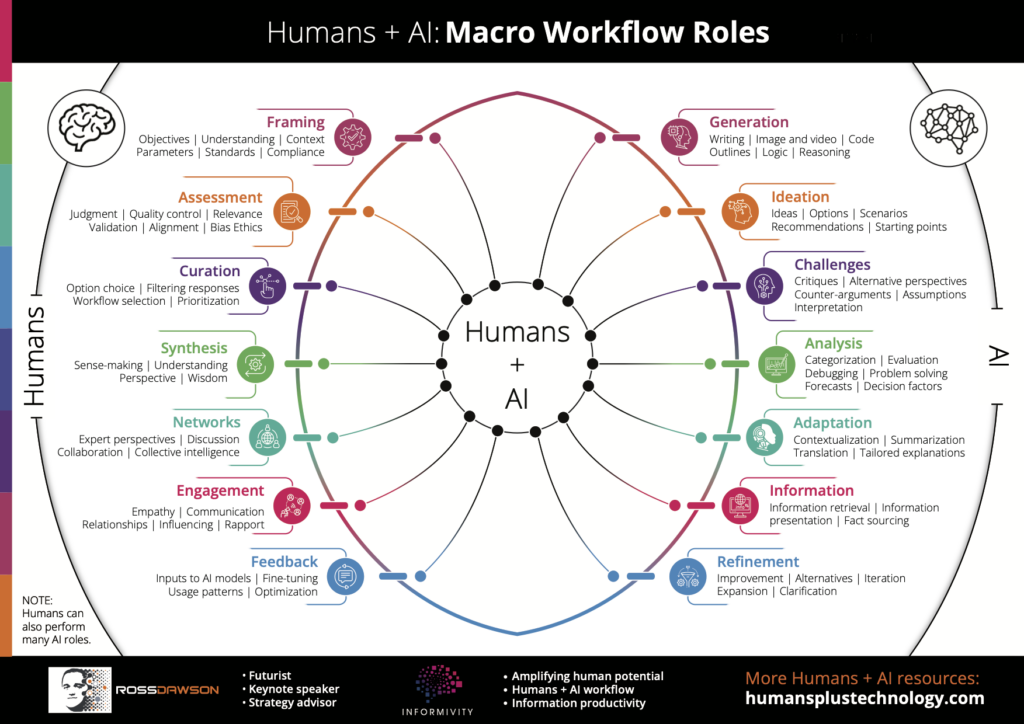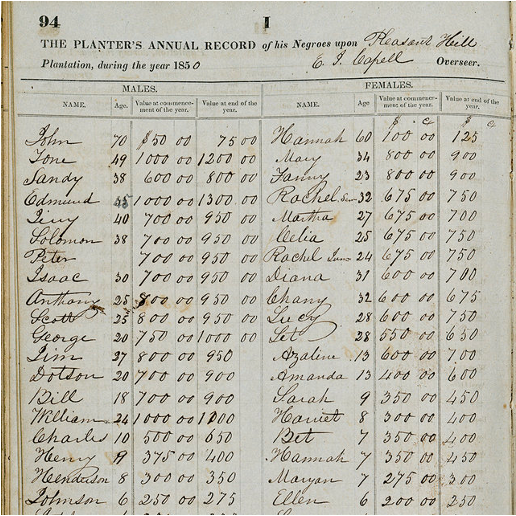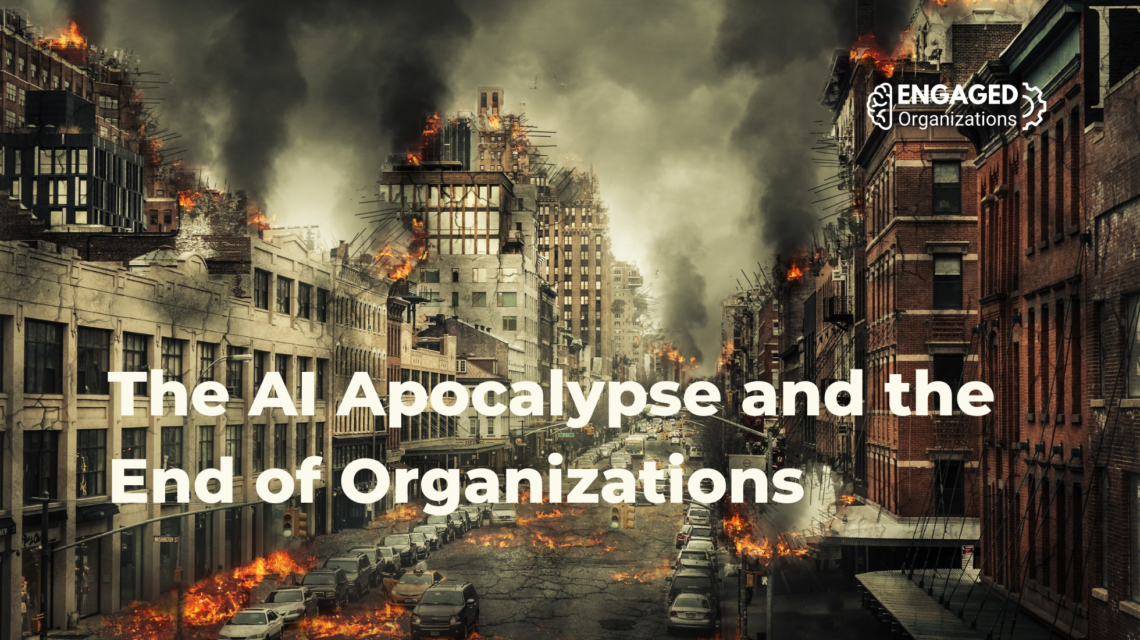AI is Amazing Technology

AI is not new but the release of ChatCPT has inserted AI into daily life. You know it’s mainstream when gardeners are using it for design and planning. It is a great way to fix HTML code. I have really appreciated they way it generates a structure and and draft of content because it makes writing much easier and provides useful scaffolding. The ability to “converse” with it to refine those drafts is wild. It will have a dramatic impact on organizations over the next few years.
I like the way that Ross Dawson defines the way in which humans and AI can complement each other. By generating content, options, alternatives, and analysis it alleviates the need to do 101 or 201 level work and leaves time for higher order framing, sense-making, and evaluation.
I will continue to use and experiment with it and I recommend you do too, if only because it will change our world. However, my experience with organizations makes me fear for what will happen to people over the next decade as companies pursue short-term wins and miss the long-term implications.
More Content and More Chaos
Because AI can do 101 and 201 work (which refers to the way college courses are numbered and describes the difficulty of the work) the theory is that people can spend their time doing more interesting, challenging, and creative work. That’s not wrong but when the average American adult reads at a 7th-8th grade reading level, AI is more likely to improve their writing rather than prompt them to stretch their expertise. It also means that anyone can create average content. There will be A LOT of average content given that it takes ChatGPT approximately 2 seconds to write an average critique of 19th-century literature.
I am sure there are tens of thousands of blog posts generated by AI out there already. It is already affecting many, many jobs; jobs at Buzzfeed, Insider, and at non-media organizations. Writing has always been a precarious profession and now it is scary – but it won’t just be writers. It will be marketers, lawyers, graphic designers, and other communicators too. It doesn’t just have impact on content creators though – it will drown all of us in information. That deluge of information will mostly be… average, just like it is now but there will be so much more of it that finding the interesting, thoughtful, or insightful will become too challenging to do. The result is that people will start turning away from the streams and channels that generate the most content and who can blame them – it is happening already as people become disillusioned with social media.
For Organizations, Governance Always Wins
This deluge of content will have a dramatic impact on organizations – it already has. – but organizational governance has not kept up. In over 15 years of working with organizations to engage customers, employees, and stakeholders I have not seen much evidence that most can change. Their executives say nice things and many likely have the best intentions but efforts to change at the organizational level are mostly performative. They re-organize (really, again?), pay millions of dollars to consulting firms to project serious intent, or support small efforts just enough to convince people they are serious. But they are not. If they were serious, they would be radically changing their corporate governance structures but that is, of course, much harder and disruptive than moving around the metaphorical deck chairs.
If companies want psychological safety… they would sign contracts providing 18 months of full compensation to any employee that is laid off.
If companies want to create equity… they would define and publish salary grades and make everyone’s grade accessible.
If companies want engagement.. they would commit to substantive profit sharing with a more even distribution between executives and employees.
If companies want people to come to the office… they would provide free child care.
If companies want innovation… they would stop using output as a human performance metric.
If companies wanted to create belonging… they would invest in coaching for every manager (heck, for every individual), every year.
Contacts, compensation, profit distribution, benefits, metrics, and training budget are all elements of organizational governance. If complementary elements of governance do not change together, nothing will change. Organizations are systems with a myriad of influences and changing one influence out of 50 does not hit any meaningful inflection point.
AI Will Drown Us in Content and Starve Us of Value
Organizational metrics are almost exclusively focused on quantity of transactions and content. After all, most originated from accounting practices – literally counting. The problem is that volume does not equal value. We have built up our governance practices over the century based on the plantation system, where the vast majority of people were slaves doing production tasks. Ledgers became spreadsheets, which became databases.
With automation of physical production and now AI generated content, we have created a world where people can no longer produce at a rate even approaching machines – and yet we still try to measure people’s “productivity” by the volume of things people create. The introduction of AI in that context is making individuals worthless by current measurement standards. It is also flooding the world with content – a world where we were already drowning in it and which is creating massive confusion about what to trust and what is truth.
Is the logical conclusion an economy without people where AI chatbots do business with each other? Unlikely since volume still does not equal value. Value is increased or changed through changes in behavior. Behavior change is how the economics of a system shifts – and behavior is influenced more by trusted relationships than by any other factor. Behavior change is the way to generate impact, meaning, and value.
Unless organizational governance changes its fundamental orientation from output to value, we will continue to damage individuals, our planet, and our societies by producing ever-more stuff while losing meaning and connection. It is a grim outlook and, in the end, serves very few.
Valuing Humans in Corporate Governance

Have you ever wondered where the term “end-of-life” came from when talking about infrastructure?
When enslaved people were considered property, they were accounted for as assets on corporate balance sheets and end-of-life was not a euphemism. Once slavery was no longer legal, people were removed from the asset side of balance sheets because they were no longer owned property (yes, that is as horrible as it sounds). People were, however, kept on the liability side of the balance sheet because of their salaries and benefits. That was not ideal but in an age were employees were primarily production capacity, it sort of worked. But what about now? We don’t need people to staff production lines, run warehouses, or generate content.
What are humans good for?
Humans are unique in their ability to build relationships, teach, learn, energize, communicate, care, influence, and create new ideas. That has real value because it is all the things that shift the behaviors of others. None of it is included in our organizational metrics, accounting, and governance – and none of that capacity is accounted for as an asset. Instead, we hire and lay off employees like we would switch supply chains on and off – and make it even harder for our organizations to maintain trust and influence.
My hope is that the AI Apocalypse helps us understand that is was never the volume of content which mattered – it was its context and use by humans that mattered. My fear is that we are so stuck in the mindset that the volume of things more valuable than relationships that we will ruin ourselves before we figure it out.


